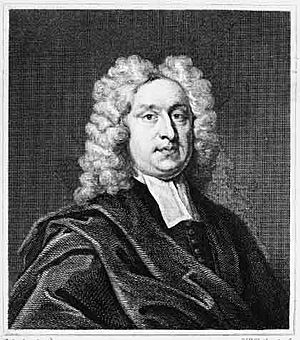Edmund Calamy (historian) facts for kids
Quick facts for kids
Edmund Calamy
|
|
|---|---|

Edmund Calamy, III, the grandson
|
|
| Born | 5 April 1671 London, England
|
| Died | 3 June 1732 (aged 61) |
| Education | University of Oxford |
| Known for | Nonconformist churchman and historian |
Edmund Calamy (born April 5, 1671 – died June 3, 1732) was an English church leader and historian. He was known as a Nonconformist. This means he was a Protestant who did not agree with or follow the rules of the official Church of England.
Contents
Edmund Calamy's Life Story
Early Life and Education
Edmund Calamy was the grandson of another famous churchman, Edmund Calamy the Elder. He was born in London, in a part of the city called St Mary Aldermanbury.
As a young boy, Edmund went to different schools, including Merchant Taylors' School, Northwood. In 1688, when he was 17, he went to study at Utrecht University in the Netherlands. While he was there, he was offered a job as a professor at the University of Edinburgh in Scotland. However, he decided not to take the job.
Becoming a Church Leader
After returning to England in 1691, Edmund began to study divinity, which is the study of religion. He took advice from a well-known minister named Richard Baxter. This led him to study at Oxford.
In 1692, he became an assistant to Matthew Sylvester in Blackfriars, London. Two years later, in 1694, he was officially ordained as a minister. Soon after, he became an assistant to Daniel Williams in London.
In 1702, he started giving lectures at Salters' Hall. The next year, in 1703, he became the main pastor of a large church in Tothill Street, Westminster. Edmund Calamy was a Presbyterian, which is a type of Protestant church. He followed the ideas of Richard Baxter.
Travels and Achievements
In 1709, Edmund Calamy traveled through Scotland. While he was there, he was given a special degree called Doctor of Divinity. This honor came from three universities: Edinburgh, Aberdeen, and Glasgow.
His friendship with Daniel Williams was very important for his work as a historian. Edmund was one of the first people chosen to manage the Presbyterian Fund in 1703. He also helped set up the Dr Williams's Library in London. This library still exists today and holds many important books.
Edmund Calamy passed away on June 3, 1732. He was buried in St Mary Aldermanbury church. He was married twice and had 13 children, with six of them surviving him. His oldest son, Edmund Calamy IV, also became a Presbyterian minister.
Edmund Calamy's Writings
Edmund Calamy wrote many books and sermons, about 41 in total. But he is most famous for his biographies about Nonconformist ministers. His biggest hero was Richard Baxter, and he wrote three different books about him.
Documenting Nonconformist History
His first major writing project was an index for Baxter's own life story, which he published in 1696. He also added his own notes and continued Baxter's history up to the year 1691.
In 1702, he published a shorter version of Baxter's history. This book also included information about many other ministers who were forced to leave their churches in 1662. This event was called the Great Ejection. It happened after King Charles II returned to the throne. Calamy's book explained why these ministers chose not to follow the rules of the Church of England.
In 1713, he released a second, larger edition of his book. It continued the history through the reigns of King William and Queen Anne. It also included a detailed list of the ministers who were ejected in 1662.
In 1718, he wrote a book defending his grandfather and others against some criticisms. He also wrote about how the church and Dissenters treated each other in 1719. In 1727, he published an update to his account of the ejected ministers, adding more details and corrections.
Key Publications
- A Defence of Moderate Non-Conformity (1703)
- Volume 1
- Volume 2
- Volume 3
- The Inspiration of the Holy Writings of the Old and New Testament Consider'd and Improv'd (1710)
- An account of the Ministers, Lecturers, Masters, and Fellows of Colleges and Schoolmasters (1713)
- A Letter to Mr. Archdeacon Echard Upon Occasion of his History of England... (1718)
- Thirteen Sermons Concerning the Doctrine of the Trinity (1722)
 | Kyle Baker |
 | Joseph Yoakum |
 | Laura Wheeler Waring |
 | Henry Ossawa Tanner |

